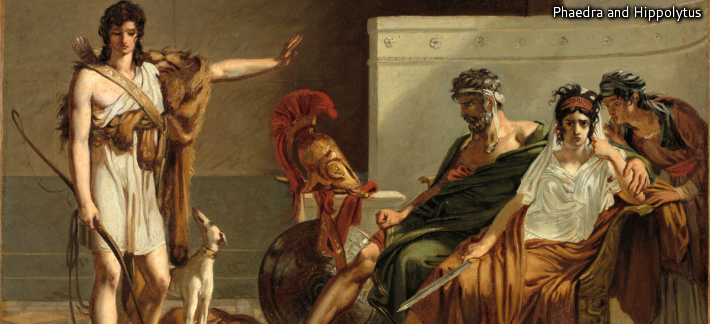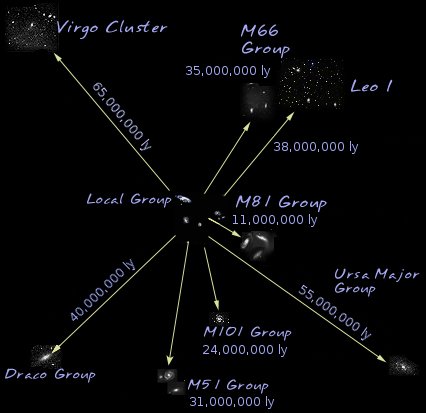
Hippolytus: Tragic tale of Theseus' Son
Hippolyta, one time queen of the Amazons, fell in love with Athenian king Theseus and abandoned the Amazons to marry him. The matter of whether or not she consented to be his wife or had no choice in the matter remains unclear. It is known that she gave birth to Theseus' son Hippolytus while in Athens. Theseus, who was heir to the throne of Troezen, sent the young Hippolytus to be raised there by the family of the aged King Pittheus. Theseus intended to have Hippolytus become Pittheus' successor in his stead. (Theseus had his hands full in Athens, thank you very much.) As one would expect, Hippolytus matured to become a strong, brave and handsome young man. Unusually, however, he also became a devotee of Artemis and resolved to remain forever virginal. Most of Artemis' chaste followers were female. Unfortunately, as we shall see, Hippolytus' devotion to Artemis and his consequent celibacy would prove to be his ultimate downfall.
While Hippolytus was living in Troezen, Theseus and Pirithous embarked on their two foolish errands: they first kidnapped Helen in the hopes of starting the great war her abduction was expected to precipitate. They then ventured into the Underworld in a vain effort to kidnap Persephone, queen to Hades. Knowing full well their intentions, Hades invited Theseus and Pirithous into his home and had them sit on chairs of forgetfulness. Once seated, they both remained trapped and insensible. A few years later, Heracles, who had arrived in the underworld to capture Cerberus as his final labor, was allowed to pull Theseus off the chair and take him back to Athens. During Theseus' absence, Hippolyta died. It was said she perished from grief at Theseus' disappearance. Soon after Theseus returned from Athens, he received a visit from Deucalion, son of Minos, the Cretan king. Deucalion informed Theseus that Minos had died. Now that he was king, Deucalion sought to form an alliance with Athens. Athens and Crete had been adversaries throughout most of Minos' reign. (Recall that Athens had once had to send an annual tribute of fourteen youths to Crete, where they were devoured by the Minotaur. The tributes stopped only after Theseus killed the Minotaur and then defeated the Cretan army in the battle that soon thereafter followed.) Theseus welcomed Deucalion and readily agreed to a reconciliation between Crete and Athens. To cement this new bond, Deucalion arranged to have Theseus marry his sister Phaedra. She was also the sister of Ariadne, the woman who, years before, had fallen in love with Theseus when he arrived in Crete to enter the labyrinth and fight the Minotaur. She offered to tell him the secret of escaping the maze provided that he would take her back with him to Athens. Theseus agreed to her terms, only to abandon her on the island Naxos the day after their departure from Crete.
Phaedra then became the new Athenian queen, but not for long. Soon after word of Theseus' underworld exploits became known in Athens, he and Phaedra were banished from the city. They traveled to Troezen, home of Theseus' son Hippolytus. Theseus probably expected to enjoy a peaceful exile in this kingdom. However, Aphrodite, who loathed Hippolytus for his aversion to women -just as she hated the Amazons for their avoidance of men- cast a love spell on Phaedra. As soon as she saw her stepson, he became secretly obsessed with him. Her affections were intensified by his kindness toward her. Being a dutiful son, Hippolytus felt honor bound to extend every courtesy to Phaedra. Misreading his constant attentions as genuine affection, Phaedra started to entertain the notion that they would one day be together. When Theseus traveled to a nearby kingdom to arrange a treaty as Pittheus' representative, Phaedra took full advantage of her husband's absence. She wrote a long letter to Hippolytus professing her deep love. She also told him that they should flee Troezen together to live forever in seclusion as husband and wife. Phaedra pinned the note to Hippolytus' door and waited anxiously for him to arrive and announce that the love was requited. He did, indeed, arrive a while later, but not to announce that the love was requited. Instead, he reproached his stepmother harshly for her inappropriate letter, repulsive suggestion of elopement and detestable profession of love. "I am appalled that you would think me capable of betraying my father in such a fashion," he sneered. "All my life, I have aspired to be as honorable with women as my father!" (Hippolytus didn't inquire too closely into Theseus' personal history.) Before he stormed out of her room, Hippolytus shouted, "I shall denounce you to my father on his return and may he have no mercy on you!" Devastated by Hippolytus' scathing rebuke, the heart-broken Phaedra sought revenge. She tore her clothes, inflicted a few bruises on her body and then wrote a letter to Theseus claiming that Hippolytus had outraged her in his absence. "I cannot bear the shame of the attack, my dearest husband," she wrote. "I am sorry I shall never see you again, but you must avenge this violation of my honor. Punish your loathsome son and may you have no mercy on him!" Phaedra then tied the note to her wrist and hanged herself. When Theseus returned, he learned of his wife's suicide and her accusation against Hippolytus. After having read the note, Theseus expelled Hippolytus from Troezen and demanded that he never return. Refusing to listen to any of his son's claims of innocence, Theseus ordered soldiers to escort Hippolytus out of the kingdom at once. "It is only for the sake of your mother's ghost that I don't slay you at once!" The dejected Hippolytus then left Troezen with nothing but a horse and a week's worth of provisions. These supplies were more than he needed, for two days after his departure, Hippolytus was riding by the sea when a wave carrying a white bull on its crest crashed onto the shore. The bull gored his horse and then stamped on Hippolytus, leaving him for dead. It was said that Poseidon orchestrated this assault, perhaps at Theseus' behest. However, Artemis soon thereafter approached Theseus and convinced him that Hippolytus was innocent. The remorseful Theseus then rode out of Troezen in search of his son, whom he found long after Hippolytus had succumbed to his injuries. Theseus brought his son's body back to Troezen for a proper burial. The beleaguered Theseus then lived in misery for he had lost his son, had disavowed his matron goddess Aphrodite for her role in bringing about Hippolytus' destruction, and had learned of his wife's deceit. Death, deception, and despair.....so much for Theseus' peaceful exile.
THE SOUTHWORTH PLANETARIUM
207-780-4249 www.usm.maine.edu/planet
70 Falmouth Street Portland, Maine 04103
43.6667° N 70.2667° W
Altitude: 10 feet below sea level
Founded January 1970
Julian Date: 24591128.16
2020-2021: XXV
THE DAILY ASTRONOMER
Tuesday, October 6, 2020
Tuesday, October 6, 2020
Remote Planetarium 103: The Virgo Supercluster
Today we ascend to the next level of physical reality. Before taking this next step, however, we should quickly review what we've covered so far.
- Earth: third planet from the Sun. Revolves around a G2V star at an average distance of 93 million miles. The only known planet to harbor life. We suspect that the Universe contains billions of such worlds.
- Solar system: the Sun and its attendant planets and other bodies are located on the Orion Spur, part of the Milky Way Galaxy's Orion-Cygnus Arm. Alpha Centauri, the nearest star system to the Sun, is located about 4.2 light years from the Sun.
- Milky Way Galaxy: located about 23,000 light years from the nucleus, the solar system occupies one of the Milky Way Galaxy's outer reaches The Sun is but one of the approximately 400 billion stars comprising this enormous system
- The Local Group: a collection of about 80 galaxies. Its two largest members are the Milky Way and Andromeda galaxies, both of which are spirals. As the Milky Way Galaxy partially blocks our view of this system, we cannot know the precise number of galaxies within the Local Group.
The next stage is the Virgo Supercluster:

The Virgo Supercluster consists of more than 100 galaxy groups and clusters distributed over an area 110 million light years in diameter. The above image, centered on the Local Group, lists the prominent groups within this Supercluster, notably the large Virgo Cluster, so named as it is located within the Virgo constellation region.

Consisting of more than 1300 member galaxies, the Virgo Cluster is the heart of the Virgo Supercluster.
Soberingly, this local Supercluster is described as a "poor" supercluster owing to its lack of a dense central region. Despite this rating, the Virgo Supercluster's volume is 7000 times that of the Local Group and 100 billion times that of the Milky Way Galaxy. The Local Group is toward the outskirts of this Supercluster.
More soberingly, the Virgo Supercluster is but one of 10 million Superclusters in the observable Universe. Our next step up will take us to the Pisces-Cetus Supercluster Complex which, we'll find, is still just a small part of the known cosmos.
To subscribe or unsubscribe from the Daily Astronomer: